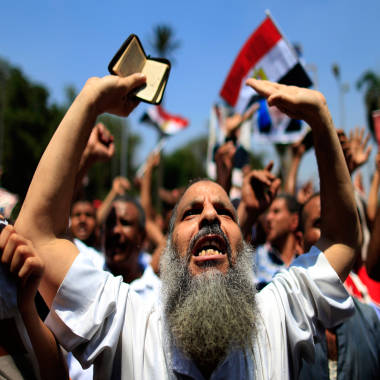For hours, there was no security in sight as the fighting ensued. Guns, stones and even fireworks were used as weapons but Morsi's supporters were driven back by the anti-Morsi demonstrators, and the military. NBC's Ayman Mohyeldin reports.
By Ian Johnston and Charlene Gubash, NBC News
Egypt?s National Salvation Front announced the appointment of an interim prime minister Saturday to run the country during a transition period in the wake of President Mohammed Morsi?s sudden ouster.
Former United Nations nuclear agency chief Mohamed ElBaradei will take his oath of office at 8 p.m. local time on Saturday, a spokesperson for the National Salvation Front told NBC News.
ElBaradei, 72, is poised to join an interim administration headed by Adly Mansour, chairman of the supreme constitutional court, who was sworn in as interim president Thursday.
Meanwhile, supporters of the deposed Morsi again gathered in large numbers Saturday, a day after clashes with security forces and anti-Morsi protesters left 36 dead and more than 1,000 injured.
A Muslim Brotherhood statement said that the movement?s leader Mohamed Badie ? who appeared at a rally on Friday after his arrest was ordered earlier in the week ? was calling for people to ?remain in the public squares of every governorate and every city until power is restored to him [Morsi] as the rightful ruler of Egypt.?
?God is great. He can crush every traitor and every treacherous tyrant. The people of Egypt will protect the Revolution, and will continue to demand their rights," Badie said, according to the statement.
Hitha Prabhakar joins MSNBC's Alex Witt to break down the 3 Big Money Headlines. She mentions that oil analysts are watching the situation in Egypt and they are saying how it will negatively impact gas prices. She discussed the jobs numbers that came out on Friday and explains what hedge fund manager Ron Baron meant when he talked about the Dow reaching 60,000.
On Friday, thousands of Morsi's Islamist supporters marched across a central Cairo bridge in the direction of Tahrir Square, which was also occupied by thousands of protesters whose demonstrations prompted the army to depose Morsi.
The Morsi supporters ended up dispersing after a clash involving a hail of stones, fireworks and sometimes gunfire. There were also clashes in other parts of the country, including Alexandria and the Sinai Peninsula, a hotbed for Islamist militants.
Mohammed Sultan, deputy head of the national ambulance service, told the AP that at least 36 people were killed in Friday's clashes, the highest death toll in one day since the latest outbreak of protests began last Sunday. Another 1,076 were injured.
Amid calls from leaders for both sides to remain peaceful, there are fears the conflict could become increasingly violent.
A new Islamist militant group calling itself Ansar al-Shariah in Egypt announced its formation amid the chaos.
PJ Crowley, former assistant Secretary of State for Public Affairs and a fellow at George Washington University, joins MSNBC's Alex Witt to explain the diplomatic implications in Egypt. Crowley does think that a military coup took place in Egypt. He says that the U.S. gives a paltry amount of civilian aid and notes that the coup is an opportunity to curtail military aid and increase civilian aid. He explains the questions that arise including, will the military have a more effective interim rule than last year before Morsi was elected and can the opposition coalesce and rally behind a single view and person.
The group said it would gather arms and start training its members, in a statement posted on an online forum for militants in the country's Sinai region on Friday and recorded by the SITE Monitoring organization, Reuters reported.
The group blamed the events on secularists, Egyptian Coptic Christians, state security forces and army commanders, who they said would turn the country into ?a crusader, secular freak.?
It denounced democracy and said it would instead champion Islamic law, or sharia, acquire weapons and train to allow Muslims to "deter the attackers, preserve the religion and empower the sharia of the Lord," SITE reported.
Egypt?s military has been at pains to stress its takeover of power was not a military coup, but an expression of the will of the people as shown by the anti-Morsi protests.
This is key as it would threaten more than $1 billion in annual military aid given by the U.S.

Hassan Ammar / AP
Days of massive protests and a military ultimatum forced the country's first democratically elected president from office.
U.S. law prohibits financial assistance to any country whose elected head of state is deposed in a military coup.
Speaking in Prescott, Arizona, Friday Senator John McCain said the aid should be suspended.
?I say that with great reluctance, but the United States of America I think must learn the lessons of history and that is: We cannot stand by without acting in cases where freely elected governments are unseated by the military arm of those nations,? he said.
McCain also called on the Egyptian military to set a timetable for elections and a new constitution.
?Then we should evaluate whether to continue the aid or not,? he said. ?I am aware that by suspending aid to the Egyptian military, which is the only stable institution in Egypt, we are risking further problems in the Sinai, and in other areas of cooperation with the Egyptian military.?
Reuters and The Associated Press contributed to this report.
Related:
This story was originally published on Sat Jul 6, 2013 4:17 AM EDT
april fools Good April Fools Jokes Dumpster Diaper the beach Fear Airport Terminal
No comments:
Post a Comment
Note: Only a member of this blog may post a comment.